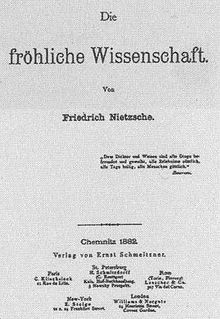The Gay Science
 |
|
| Author | Friedrich Nietzsche |
|---|---|
| Original title | Die fröhliche Wissenschaft |
| Country | Germany |
| Language | German |
| Subject | The death of God |
| Published | 1882 |
| Preceded by | Idylls from Messina (1881) |
| Followed by | Thus Spoke Zarathustra (1883–1885) |
The Gay Science (German: Die fröhliche Wissenschaft) or The Joyful Wisdom is a book by Friedrich Nietzsche, first published in 1882 and followed by a second edition, which was published after the completion of Thus Spoke Zarathustra and Beyond Good and Evil, in 1887. This substantial expansion includes a fifth book and an appendix of songs. It was noted by Nietzsche to be "the most personal of all [his] books", and contains the greatest number of poems in any of his published works.
The book's title uses a phrase that was well-known at the time. It was derived from a Provençal expression (gai saber) for the technical skill required for poetry-writing that had already been used by Ralph Waldo Emerson and E. S. Dallas and, in inverted form, by Thomas Carlyle in "the dismal science". The book's title was first translated into English as The Joyful Wisdom, but The Gay Science has become the common translation since Walter Kaufmann's version in the 1960s. Kaufmann cites The Shorter Oxford English Dictionary (1955) that lists "The gay science (Provençal gai saber): the art of poetry".
In Ecce Homo, Nietzsche refers to the poems in the Appendix of The Gay Science, saying they were
...written for the most part in Sicily, are quite emphatically reminiscent of the Provençal concept of gaia scienza—that unity of singer, knight, and free spirit which distinguishes the wonderful early culture of the Provençals from all equivocal cultures. The very last poem above all, "To the Mistral", an exuberant dancing song in which, if I may say so, one dances right over morality, is a perfect Provençalism.
...
Wikipedia
